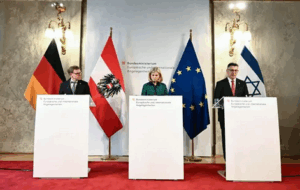Israel, EU reach deal to significantly increase aid into Gaza through newly opened routes

Israeli Foreign Minister Gideon Saar, Austrian Foreign Minister Beate Meinl-Reisinger and German Foreign Minister Johann Wadephul in Vienna on 10 July 2025
Liza Rozovsky reports in Haaretz on 10 July 2025:
The European Union and Israel reached an agreement on Thursday to significantly increase the daily supply of humanitarian aid into Gaza.
An EU official told Haaretz that the agreement was finalized on Wednesday night and currently exists only in verbal form. “Following the Israeli Cabinet’s resolutions and the constructive dialogue between the EU and Israel, significant steps have been agreed by Israel to improve the humanitarian situation in the Gaza Strip,” said EU High Representative for Foreign Affairs Kaja Kallas.
The agreement will allow the reopening of aid routes that had previously been closed. In addition to routes through Egypt and Jordan, several crossings in northern and southern Gaza are expected to resume operations.
According to the agreement, bakeries and hot meal distribution centers will be permitted to operate, and fuel supplies to humanitarian facilities will be renewed. Essential infrastructure will also be repaired, including the restoration of electricity to the desalination plant.
At a joint press conference in Vienna with the foreign ministers of Germany and Austria, Israeli Foreign Minister Gideon Saar said that “following [Israel’s] dialogue with the European Union, the political-security cabinet made a decision on Sunday to further improve the humanitarian situation in Gaza, including more trucks, more [open] crossings, and more [access roads] for the humanitarian effort.”
He added that dialogue with the European Union is “important, and will continue.” He also thanked Germany and Austria for “standing by Israel.”
In a press statement, Kallas emphasized that the steps are being implemented – or will be in the coming days – “with the common understanding that aid at scale must be delivered directly to the population and that measures will continue to be taken to ensure that there is no aid diversion to Hamas.”
The statement also noted that “the EU stands ready to coordinate with all relevant humanitarian stakeholders, UN agencies and NGOs on the ground, to ensure swift implementation of those urgent steps.”
In an interview with Bloomberg on the sidelines of a summit in Kuala Lumpur, Kallas added that the deal was reached on very concrete terms, including the number of trucks that will enter, the number of crossings that will open, and the location of distribution points, so people can receive assistance, including water. Kallas also called for an immediate cease-fire and the release of all hostages held in the Gaza Strip.
The EU’s new envoy to the Middle East, Christophe Bigot, who has been in Israel over the past week, conducted the negotiations, according to the source. The official added that the Israeli side had requested the EU not publish the agreement due to concerns over Israeli public opinion, but the details were ultimately leaked to Bloomberg.
The official clarified that the agreed-upon aid will be delivered through the EU’s traditional humanitarian partners, led by the EU, and not through the Gaza Humanitarian Fund (GHF).
From Israel’s perspective, the move is intended to preempt the possible imposition of sanctions over its failure to comply with the conditions of its Association Agreement with the EU. Last month, after the EU report on Israeli human rights violations in Gaza and the West Bank was submitted to the EU Council of Foreign Ministers, Kallas said she intended to work with Israel to find a solution.
EU foreign ministers are expected to discuss possible steps on the matter next week.
This article is reproduced in its entirety
